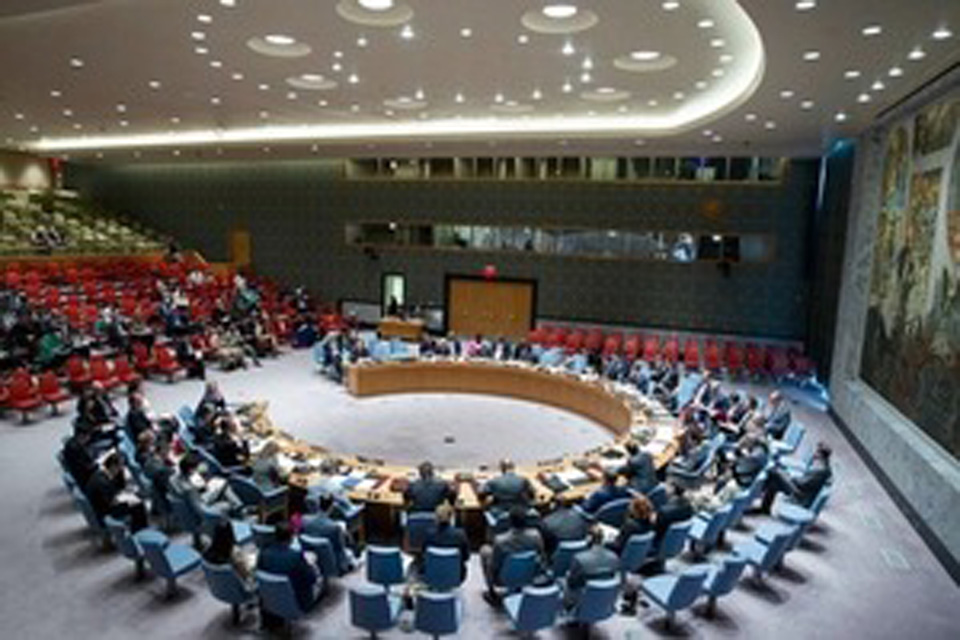"Kosovo’s progress is now undeniable."
Statement by Alexandra Davison, Deputy Political Coordinator of the UK Mission to the UN, at the Security Council Debate on Kosovo.

Thank you Madam President. And I thank Special Representative of the Secretary-General Zarif for his briefing. I welcome that we are again joined by Deputy Prime Ministers Dacic and Thaci and I thank them for their interventions.
Madam President,
It has been three months since we last met to discuss the UN Mission in Kosovo. In that time we have seen continued welcome progress. The new government has launched its programme of work and the European Union high-level dialogue has resumed. Action is being taken on tackling Foreign Fighters and on the Special Investigative Task Force.
But challenges remain. It is disappointing that the Kosovo Assembly Presidency has postponed voting on the Special Court. This delay risks calling into question Kosovo’s commitment to the rule of law and to dealing with war crimes. If the vote is delayed further, it would affect Kosovo’s reputation. So it is vital that the vote happens at the earliest opportunity. The establishment of the Court will be an important step for Kosovo’s efforts to tackle impunity.
Despite this setback, the direction of travel remains positive. I want to focus on three areas where progress has been most important this quarter.
First, I join others in welcoming the consolidation of the new government of Kosovo. In its first 100 days, the government has set out an ambitious programme to improve reconciliation, tackle economic reform and strengthen the rule of law. It now needs to press on with its programme, in order to improve people’s daily lives in Kosovo. The government has set clear direction in spite of challenges. The protests in January and the boycott by the Srpska List ministers and parliamentarians that followed were early tests for the new administration. We welcome the return of Srpska List to the government and parliament following the end of the boycott last month, and we commend the response of the Kosovo police to the protests. We are pleased that the security situation has remained stable, as the Secretary-General’s report notes, though were shocked by the recent violence in nearby Kumanovo. We welcome the positive role played by the Kosovo government in calming tensions after this tragic incident.
Second, we welcome the important steps that the government has taken to address economic development in Kosovo. In a country where far too many young people are struggling to find employment, such steps are desperately needed. This means developing the economy, attracting inward investment and creating jobs, to give people a new sense of hope. For this to happen, the government needs sustained and energetic focus on the rule of law, tackling corruption, promoting judicial reform and creating the conditions for investment and enterprise to flourish.
The consequences of not addressing economic development can be seen in the worrying increase in illegal migration. This issue not only deprives Kosovo of talented workers, but it leaves migrants open to abuse, trafficking and exploitation. We welcome the urgent steps that the Kosovo government has taken to combat criminal networks and to increase public awareness of this issue. And we commend the co-ordinated efforts of the region, including European Union member states, to help arrest this exodus.
Madam President,
My final point concerns the EU high-level dialogue with Serbia. Last month marked the second anniversary of the historic Brussels agreement, signed by Deputy Prime Ministers Dacic and Thaci who are with us today.
Though the pace of progress has been measured, we should not underestimate how far Serbia and Kosovo have travelled towards the normalisation of relations. In the past two years, agreement has been reached on a wide number of issues, including border management, regional cooperation, the judiciary, civil protection and policing. And at the local level we are seeing good cooperation – including on housing in Mitrovica and policing in Kline.
We congratulate both countries on the commitment they have shown to the dialogue. The United Kingdom is a strong supporter of both Serbia’s and Kosovo’s EU perspectives. We look forward to further implementation of the outstanding elements of the Brussels agreement, including the establishment of an Association of Serb Majority Municipalities.
Madam President,
Let me close with a familiar point. Kosovo’s progress is now undeniable. Relations with the region, and with Serbia, are at their strongest. Over half of the UN’s membership now recognises Kosovo as an independent, sovereign state, as do many international institutions.
It is because of this progress that we say again that it is long past time to reduce the frequency of these meetings. The realities on the ground, as reflected in the Secretary-General’s report, do not merit this level of Council attention, particularly when there are so many more pressing calls on our time.
As we move into the third year of EU facilitated dialogue between Serbia and Kosovo, we must acknowledge that it is the EU, rather that this Council, that will bring momentum for further progress. Our efforts must therefore focus on supporting dialogue in Brussels rather than in this forum in New York.
Thank you Madam President.